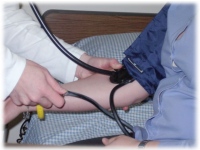| |
| |
 |

Traditional
Baccalaureate Programs.
Entry into a baccalaureate program leads to a Bachelor of Science
Degree in Nursing and eligibility to take the professional licensing
examination (NCLEX-RN). Many students enter a baccalaureate program
directly from high school, having taken college preparatory courses
which prepare them for college courses in science, social science,
humanities and nursing. Some students transfer from Community Colleges
taking prerequisite courses before entering a baccalaureate program.
Others enter the baccalaureate program after having been out of
high school for a number of years, choosing a nursing career later
in life.
|
 |
RN to BS Programs
Building on prior education in nursing, Bachelor of Science in Nursing
Programs for RN’s (RN to BSN) provide professional education
that includes nursing, liberal arts and sciences coursework that
form the foundation for professional nursing practice. All RN to
BSN programs accept transfer credit from prior nursing education,
pre-requisites to the nursing program and general studies courses.
RN to BS programs
enable RN's to develop stronger clinical reasoning skills to enable
career advancement.
LPN to BS Programs
LPN to BS programs are designed to educate the LPN as a
professional nurse. Some programs may award advanced course standing.
Second Bachelor's Degree Programs
Second Baccalaureate degree programs are designed for non nurse
baccalaureate graduates who wish to enter nursing. Most of these
accelerated programs are 16-18 months in length and provide eligibility
for graduate to take the NCLEX- RN exam. These programs are rigorous
due to their accelerated nature. Theory and clinical practice is
provided in medical-surgical, mental health, community health, maternity
and pediatric nursing. Students are accepted from a variety of previous
majors, some mid-career changers, others directly from their first
undergraduate program.
Master's Level Entry Programs
Non-nurse
College Graduates to Master's in Nursing Program.
Direct
entry or accelerated MSN programs, also known as “graduate
entry” or “master’s entry ” programs, are
designed for non-nurses who hold bachelors’ degrees in non-nursing
fields. These programs give students credit for having completed
their liberal arts requirements and allow them to complete an accelerated
schedule of undergraduate nursing coursework before moving directly
into graduate nursing coursework -- combining preparation for RN-licensure
with advanced training in a master’s specialty area. Direct
entry MSN programs typically require two to three years to complete,
with the first year focused on the entry-level pre-licensure nursing
curriculum and the last one to two years dedicated to the master’s-level
advanced nursing curriculum.
|
|

